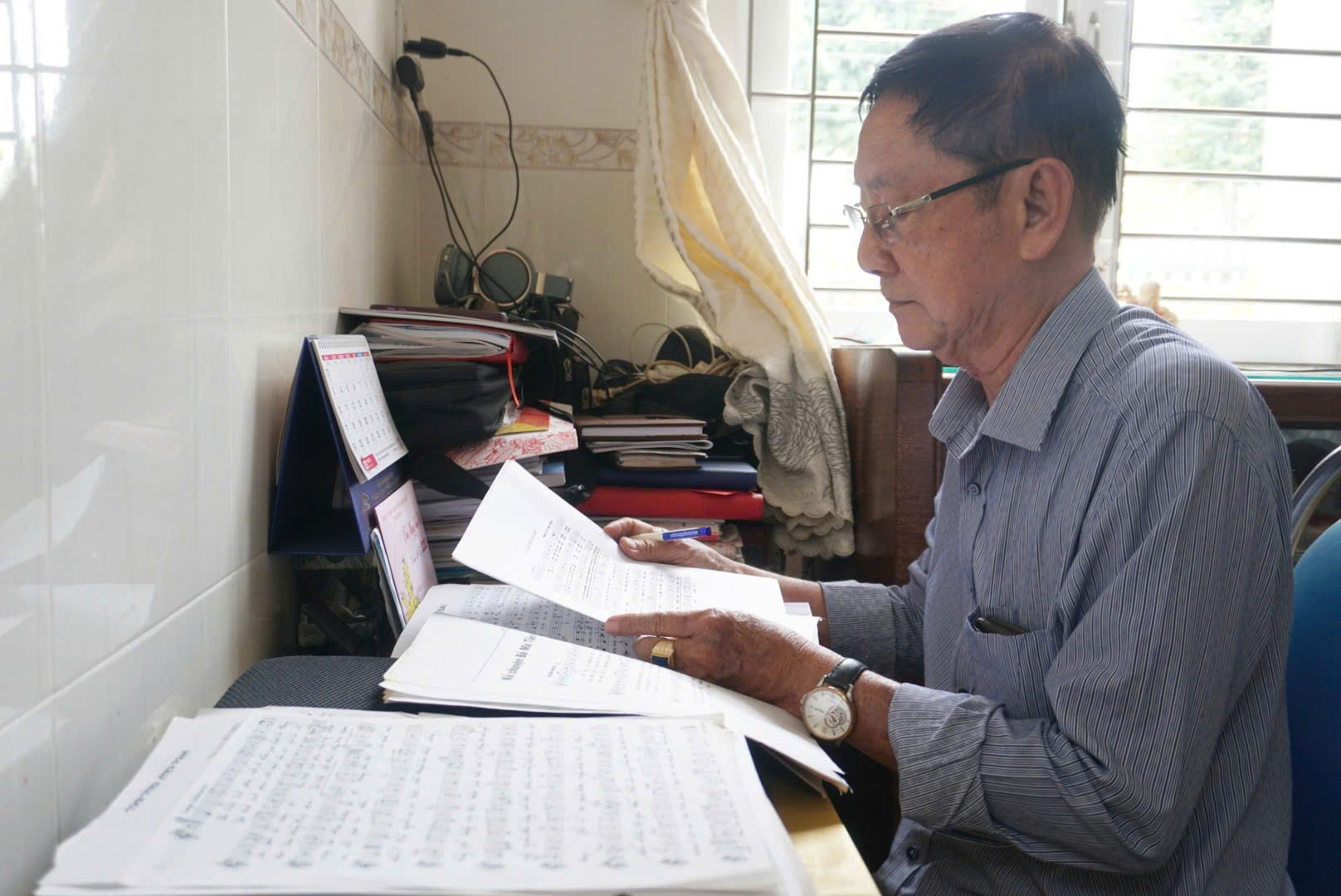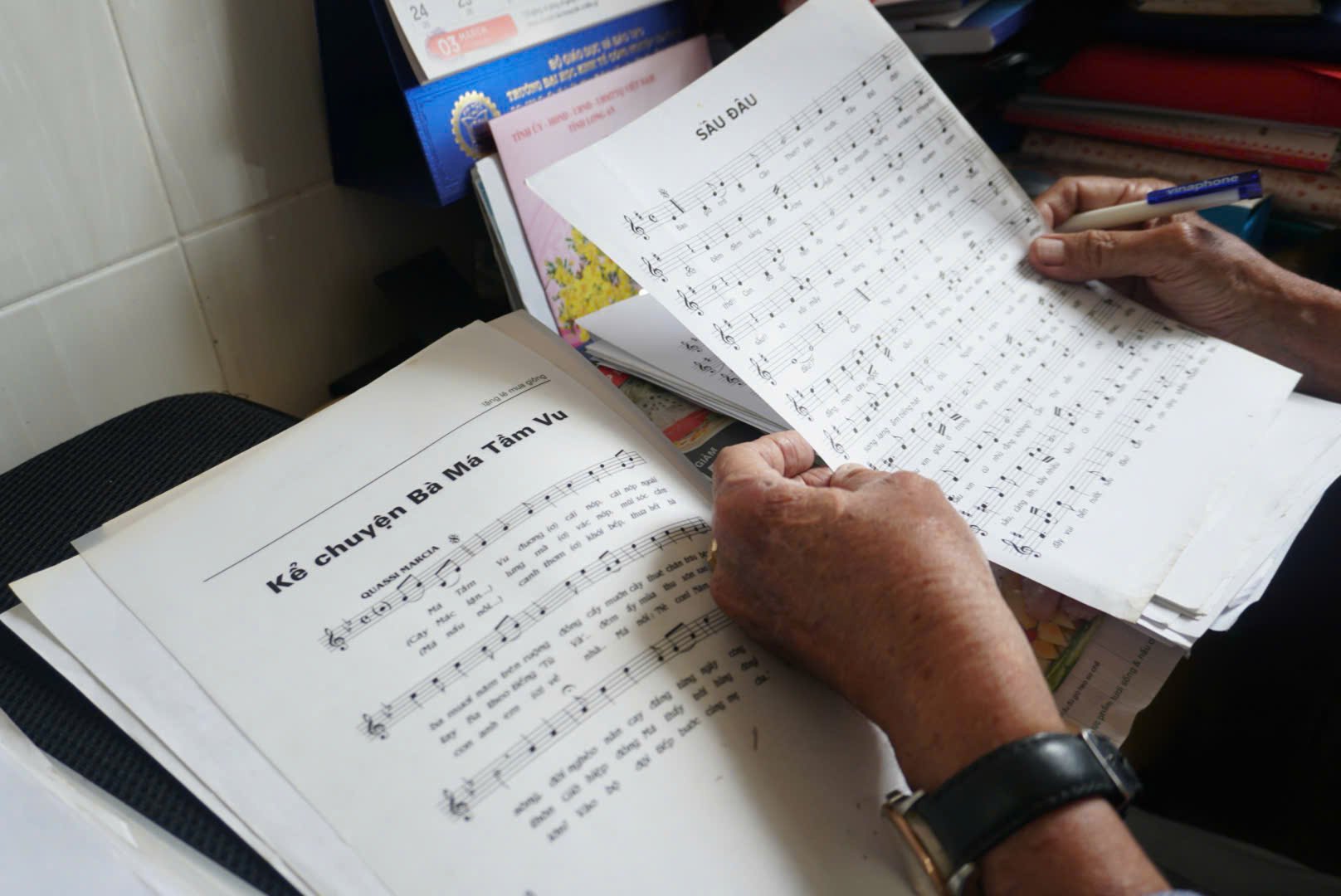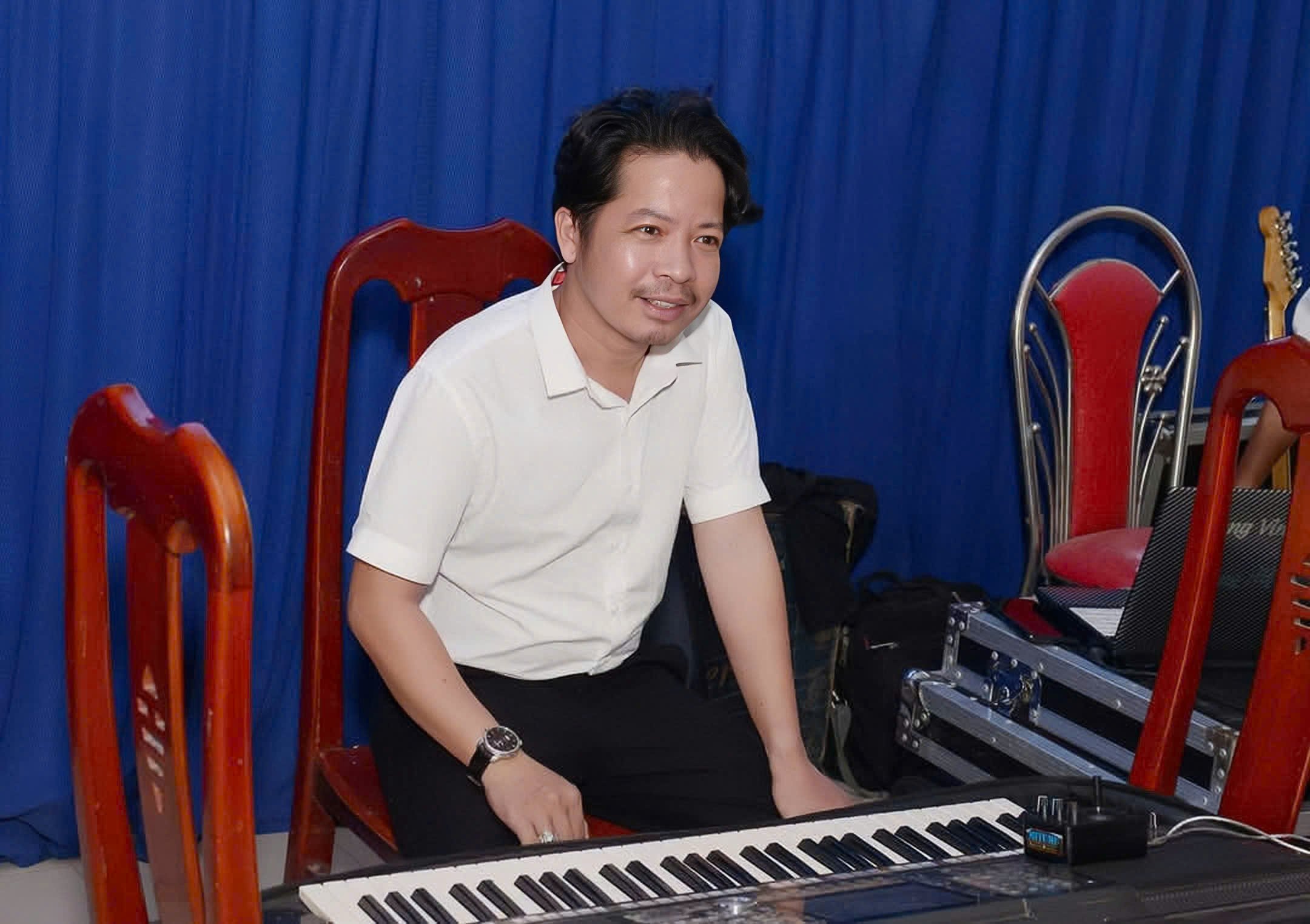Despite his old age, musician Buu Thiet still diligently composes songs about love for his homeland and country.
Melody "weaves" national memories
Up to now, musician Buu Thiet has composed more than 200 songs, poems, prose and many musical works have been broadcast at festivals and competitions in Long An province and nationwide. From the role of Executive Committee Member of the Provincial Literature and Arts Association to the Head of the Provincial Vietnam Folk Arts Association, he is devoted to the mission of connecting national culture and contemporary music . There is no need to show off techniques or elaborate layers, Buu Thiet's music is simple but the more you listen, the more you feel imbued with a love for the homeland .
One of the most outstanding songs by musician Buu Thiet is The immense flute, which was awarded the National Prize in 1998 in the composing campaign for the 50th anniversary of War Invalids and Martyrs Day. The song opens with Literature - Arts 40 Ngoc Han, poetic images: "It sounds like waves lapping from the river, it sounds like footsteps of people running, from the fragrant alluvial fields, from the flood that passes, the sound of the flute flutters!". The sound of the flute, the smell of the alluvial fields - symbols of memory, love and nostalgia are cleverly interwoven in the fierce space of war: "Standing tall in the middle of the boiling battlefield / Eyes straining against the sky of fire and smoke... the flash of bombs...". The lyrics are poetic but not meaningless, they are echoes from the war, from the footsteps of soldiers crossing the fields, leaving behind "the season of bombs and storms" and "lullabies drying in the fields".
If The Immense Flute is a call echoing from the years of bombs and bullets, Telling the Story of Mother Tam Vu is the musician's profound memory, associated with the love for the land of "birth" and the image of the hard-working, indomitable Southern mother in the two resistance wars against French colonialism and American imperialism.
The Story of Ba Ma Tam Vu is one of the songs that musician Buu Thiet loves the most.
“Ma Tam Vu is wearing a hat, a hat for over thirty years in the fields, working as a hired plowman and herding buffaloes by the riverbank”. Here, the image of the “hat” - an item associated with Southern peasant women - appears repeatedly as a symbolic motif, evoking a lifetime of hard work. His writing style does not fall into tragedy, but instead incorporates narrative elements through each small story, each word of advice from the mother: “Mother said: “Hey, son! This year you have grown up! Join the army to follow in the footsteps of your parents”, the light marching rhythm (quassi marcia) combined with the short, strong notes make the image of the mother appear not only in a hard-working appearance but also full of pride as a spiritual pillar of the resistance.
| Melodies of love for the homeland exist like the call of home, need to be preserved and resound forever in the flow of time. |
"Wrapping" love for the homeland into lyrics
Born and raised in Phuoc Vinh Dong commune, Can Giuoc district, musician Gian Thanh Trong Vinh carries a deep affection for his homeland through every scene of daily life and childhood memories. Starting to compose in 2015, he came to music through listening and contemplation. Although he is a son of the delta region, his compositions are often associated with the sea because in musician Trong Vinh's music, the sea is the place that preserves aspirations, identity and nostalgia for the country.
Musician Gian Thanh Trong Vinh (right cover, front row) actively participates in activities of the Provincial Music Association.
Perhaps up to now, Southern Night Listening to the Sound of the East Sea Waves is one of the most successful works of musician Trong Vinh when he won the Third Prize in the 2020 Mekong Delta Songwriting Contest. The opening melody is slow and passionate, leading the listener into the Southern space of a clear, windy night: "Southern Night, listening to the wind singing softly by the immense, poetic river". The music here is not simply descriptive but also depicts the sound of wind, rice, moonlight mixed with the melodious sound of the zither in the ear, creating a resonant image-sound effect.
However, the real emotional climax lies in the passage: “Oh Truong Sa! Listen to each fierce wave! Lapping against the shore like in my heart”. The image of “fierce waves” lapping against the shore is a metaphor for the lingering pain of sovereignty over the sea and islands. Musician Trong Vinh lets his heart rise in each note, each lyric. “Oh Hoang Sa! Every night I am restless” - the lyrics burst out like a burning call that is both deep and sorrowful. In particular, the repetition of the refrain: “Southern night, listen to the sound of Truong Sa waves... Southern night, waves in my heart or the sound of East Sea waves” is like an echo affirming the unchanging position of the sea and islands in the hearts of the children of Lac Hong.
For musician Trong Vinh, love for the sea and islands and his hometown of Can Giuoc are his endless inspirations for composition.
If Southern Night Listening to the Sound of the East Sea Waves mentions the issue of the sea and islands, then Come to the Lower Region Listening to You is a sweet, lyrical folk song, filled with the author's love and nostalgia for his hometown Can Giuoc. The song begins with a simple yet evocative image: "Come to the Lower Region Listening to You, there is a river flowing to the vast sea/ I love the ferry boat in the afternoon sun taking passengers across the river." The melody is as soft as a gentle river, combined with the lyrical 6/8 rhythm, making the song like a sweet story.
The lyrics: “Returning to Can Giuoc, my hometown, for many years the fields have been sour and the water has been salty/ The funeral oration has been passed down through generations” is both a cultural document and a symbol of local pride. Musician Trong Vinh skillfully inserted the images of “patriots”, “ancestors”, “old river wharf” - all creating a multi-layered emotional space, both private and communal. In particular, the climax: “Can Giuoc hero! Ho oi!” with the chanting of Southern folk songs, pushes emotions to the peak, like a call from the past that makes listeners not only moved but also want to preserve and continue.
In an era of many changes in the music industry, compositions such as The boundless flute, Telling the story of Mrs. Tam Vu, Listening to the waves of the East Sea at night in the South or Listening to you in the summer still exist quietly, like the underground cultural streams that flow silently in the Vietnamese soul. Melodies about love for the homeland exist like the call of home, need to be preserved and resonate forever in the flow of time./.
Ngoc Han
Source: https://baolongan.vn/giai-dieu-di-cung-nam-thang-a194369.html






![[Photo] Journalists moved to tears at the Memorial Service for the soldiers who died in Gac Ma](https://vphoto.vietnam.vn/thumb/1200x675/vietnam/resource/IMAGE/2025/5/30/9454613a55c54c16bf8c0efa51883456)

![[Photo] General Secretary To Lam receives Chief of the Central Office of the Lao People's Revolutionary Party](https://vphoto.vietnam.vn/thumb/1200x675/vietnam/resource/IMAGE/2025/5/30/140435f4b39d4599a3d17975dfb444c5)
![[Photo] A delegation of 100 journalists from the Vietnam Journalists Association visits the soldiers and people of Truong Sa island district.](https://vphoto.vietnam.vn/thumb/1200x675/vietnam/resource/IMAGE/2025/5/30/0984a986227d4e988177f560d2e1563e)
![[Photo] National Conference "100 years of Vietnamese Revolutionary Press accompanying the glorious cause of the Party and the nation"](https://vphoto.vietnam.vn/thumb/1200x675/vietnam/resource/IMAGE/2025/5/30/1cf6cd5c8a934ebfa347028dcb08358c)
















































































Comment (0)